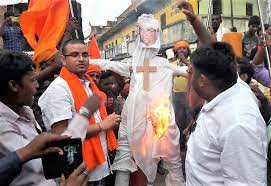Fatwa Issued Over World Cup Annoyance
By Sumayyah Meehan, MMNS Middle East Correspondent
 The World Cup is over, but the annoying buzz of the vuvuzela is undoubtedly still ringing in the ears of scores of soccer fans. Love it or hate it, the vuvuzela has become the unofficial mascot of the sporting world’s biggest event and a highly sought after souvenir for fans who did not even attend the World Cup in South Africa. Move over Zakumi, the official 2010 World Cup soccer-loving leopard, because the vuvuzela is here to stay.
The World Cup is over, but the annoying buzz of the vuvuzela is undoubtedly still ringing in the ears of scores of soccer fans. Love it or hate it, the vuvuzela has become the unofficial mascot of the sporting world’s biggest event and a highly sought after souvenir for fans who did not even attend the World Cup in South Africa. Move over Zakumi, the official 2010 World Cup soccer-loving leopard, because the vuvuzela is here to stay.
The meter long horn is traditionally made out of a kudu horn and was used to signify the commencement of an event. About fifteen years ago, a South African businessman saw an opportunity to turn the horn into a noisemaker. He manufactured vuvuzelas out of tin and sold them at sporting events. Soon a South African sporting goods company picked up on the vuvuzela craze that was sweeping soccer fields all across the country and began mass producing them out of cheap colored plastic.
Today the majority of plastic vuvuzelas are manufactured in China and exported around the world including the Middle East, which has recently seen an influx of the plastic vuvuzelas in many countries. Several businesses in the Gulf have seized upon the opportunity to make a quick buck from the soccer fever that has griped the region from the very first match.
The United Arab Emirates (UAE) has been just one Middle Eastern country struggling to cope with revelers blowing on their vuvuzelas merely at will, creating noise pollution wherever they go. As a result, the UAE’s General Authority of Islamic Affairs and Endowments has issued a stern fatwa that has placed the vuvuzela in hot water. According to the fatwa, any type of noisemaker that exceeds more than 100 decibels can damage the ears. Anything that is detrimental to human health is forbidden in the Islamic faith. The fatwa further states that vuvuzelas cannot be used, even in sports stadiums, if they cause harm to the person blowing them or other spectators.
Not long after the fatwa was issued, reporters for the UAE’s “The National†newspaper put one of the plastic vuvuzelas to the test. And it failed miserably reaching over 126 decibels. However, like most things that are banned in the Middle East, the vuvuzela will not only thrive but also evolve so long as someone can make money off it. Case in point, the lead laden Chinese toy scare a few years ago which had retailers across Europe and North America pulling toys made in China off shelves faster than most kids could sniffle. There was no such recall in the Middle East. In fact, unsuspecting customers can still find many of the recalled toys on store shelves today simply waiting to be purchased.
12-29













2010
795 views
views
0
comments